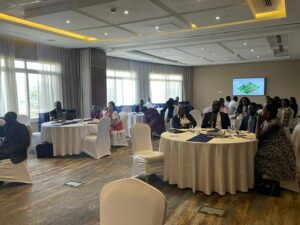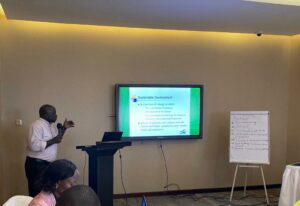GGGI Uganda under the European Union funded Greening Uganda’s Urbanization and Industrialization project and organized a workshop on the 31st of January 2023. This workshop aimed at raising awareness about green industrial approaches and enabling the Uganda Free Zones Authority (UFZA) and the private sector to gain a deeper understanding of the nuggets embedded in the green industrial guidelines and their applicability in the planned Public Free Zones.
Having completed the guidelines there was a need to popularise them to ensure the adoption of the proposals by the Ministries, Departments, and Authorities and the uptake of green industrial practices by the private sector. There is a need for stakeholders to speak the same language when it comes to issues of green industrialization. Uganda faces the challenge of adopting a pathway on how to advance her economic transformation and industrialization paths while being responsive to required climate change action. In the current climate debate, however, there has been talk of how to link these efforts in a win-win way, a reason that justifies green industrialization for Uganda.

Participants at the workshop.
Green industrialization aims to decouple economic growth from negative environmental externalities by maximizing the application of clean energy, sustainable inputs and green-production technologies and good housekeeping practices in industrial establishments. It is upon this background, that GGGI supported the Government of Uganda to complete the Green Industrial guidelines. It offers a pathway for implementing the green industrialization agenda through the promotion of the eco-industrial park concept and the promotion of greener approaches.
It is worth noting that UFZA plans to establish Public Free Zones across the four regions of the country. To the private sector that currently operates under the Free Zones, the working session will enable them to understand how the proposals in the guidelines can be applied; from developing a business plan that will attract financing, to developing a master plan that takes into consideration symbiosis between tenants, how to set up park management procedures to support day to day operations and to understand greener approaches to industrial processes like RECP to mention but a few.
During the workshop, it was noted from the presentations and discussions that Uganda’s industrial production and consumption patterns outpace the renewal capacity of natural resources and the government’s capacity to manage waste products. These trends in resource use and energy consumption indicate that current forms of industrial production are not sustainable in the long run and risk undermining the social and economic development benefits achieved thus far. Thus, calling for a shift toward green and more sustainable approaches needed to satisfy the needs of the present – without comprising the needs of future generations.

Mr. Ssebagala Silver during his presentation at the workshop
The Uganda Cleaner Productions Center (UCPC) Executive Director, Mr. Ssebagala Silver during his presentation at the workshop, introduced Resource Efficient and Cleaner Production (RECP) as a tool for sustainable development. The tool prevents waste directly from the source which is both environmentally friendly and economically viable. The participants were taken through the five pillars in an organization structure that lead to waste generation and cleaner production techniques such as input substitution, good housekeeping, technology change, better process control, product modification and on-site recovery/reuse/recycling, and equipment modification. All of these reduce the cost of production to maximize profits.
The elaboration of the country’s Vision 2040 provides the foundations for a “green economy and clean environment where the ecosystem is sustainably managed and the liveability of the urban systems is greatly improved”. This is one of the bases of Uganda’s green pathway.